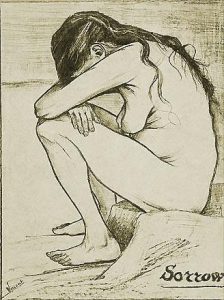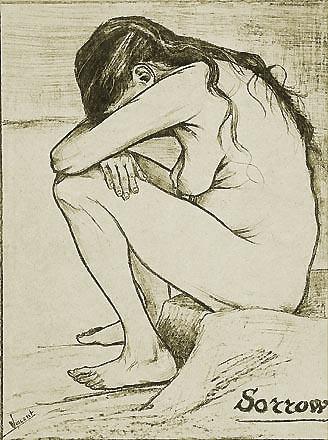This post is also available in Dutch.
Most people, at some point, deal with symptoms from psychological disorders. To cope, we usually choose medication and/ or therapy, but their effects on the brain greatly differ…

A drawing of sorrow in a lithography from Vincent van Gogh, 1883 (image from public domain)
Anxiety and depression are two of the most common symptoms of psychological disorders worldwide. Researchers from Amsterdam compared 66 studies against each other and were able to show that psychotherapy and antidepressants, the standard treatment against anxiety and depression, has different effects on the brain. Psychotherapy can strengthen brain regions that control our emotions, whereas antidepressants reduce or inhibit activity in overactive brain regions that control our emotions.
Less control of your emotions during anxiety and depression
Brain regions associated with emotions and emotional control work differently when dealing with anxiety and depression. Take for instance the amygdala. This structure, which lies deep inside our brain, sends a signal when danger is present in our environment. It communicates with control areas in the front portion of our brain, such as the frontal cortex, which aims to keep the amygdala in check by restraining and regulating it. During anxiety and depression, the amygdala is hyperactive and the frontal cortex is hypoactive (less active), and this appears to be due to a lack of communication between the two.
The difference between psychotherapy and antidepressants
When treating anxiety and depression during psychotherapy, clients are exposed to situations or objects that trigger negative emotions with the aim of ‘unlearning’ those negative feelings or coping with them.
Alternatively, antidepressants, commonly called selective serotonin re-uptake inhibitors (SSRI’s), target the serotonin system. Serotonin is a neurotransmitter that influences the regulation of almost all neural processes such as emotions, sleep, pain and more (read more about the effects of SSRI’s in a previous blog). Antidepressants inhibit the re-uptake of serotonin in the brain so that the level of serotonin increases. This in turn appears to help with anxiety and depression, because the level of serotonin can be quite low for these kinds of disorders.
Whether medication and/or psychotherapy is the better choice, differs depending on the person and the degree of their symptoms. Based on this research, it would seem that a person has to make a decision between gaining control over their emotions or inhibiting them. But let’s not forget about the long-term effects, because learning coping mechanisms appears to provide continued effects when compared to taking a pill. Moreover, the effects from antidepressants can be quite extensive, in that its side effects can range from migraines, to unrest, to a decrease in sexual arousal or impotence.
More information:
More information and research on psychological disorders in the Netherlands can be found at NEMESIS.
